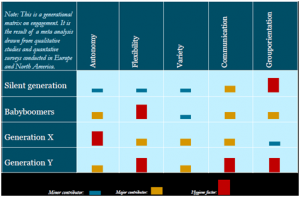While preparing a client event on Digital and Security a few months ago, I was wondering what is the best way to integrate young new comers (freshers) within a company, taking into account their behaviors, willings and views on professional IT. I had the opportunity to read a very good report (author: linus.jonkmam – se.linkedin.com/in/linusjonkman/) providing a global vision on that matter. The real challenge is more the good collaboration between three or four generation workers than the way to integrate one. I would like to share some extracts that well illustrate this very interesting approach. Question: Why is the generational perspective interesting for an organisation?
- It increases the tolerance within the organisation
- It helps you understand how to create an engaging work environment (which in turn increases productivity, loyalty and stress resistance)
- It provides an opportunity to strategically manage and influence your brand’s perceived value from a generational standpoint
- It adds an extra dimension of performance to succession planning
- It helps you understand how to acquire and secure the right talent
- It allows you to exercise leadership that is effective and plays to the strengths of any generationyou are dealing with
 Silent generation (1925-1942):
Silent generation (1925-1942):
- Behaviour: Loyal, polite, conservative, dutiful, considerate, respects authority, thrifty, collective-oriented, persevering
- World events: Cuban Missile crisis, Kennedy assassination, Normandy, Korean War
- Media heroes: Marlon Brando, Fred Astaire,Ginger Rogers, John Wayne, Billie Holiday, Orson Wells, Disney, Frank Sinatra, Nat King Cole, Brigitte Bardot, Marilyn Monroe
- As Coworkers: Silents are enduring team players. Equipped with a sense of stability and teamwork they are stable coworkers. The silent are persevering in nature and firmly believe that it is a noble cause to be loyal to an employer.
- As Consumers: They react positively to marketing messages that connect them to other people, while provocative, adventurous or unconventional ads turn them away. Successful ads use beautiful visual scenery and often use a strong authoritative person such as an expert to present the message.
 Babyboomer (1943-1960) (I am here, and YES, Sean Connery is 007!):
Babyboomer (1943-1960) (I am here, and YES, Sean Connery is 007!):
- Behaviour: Outspoken, Engaged, Materialistic, Powerful, Passionate, Idealistic, Views the world as black or white, Opportunistic entrepreneours, males are often louder and more competitive than the females
- World events: Moon landing, Kennedy assassination, Vietnamwar, Woodstock, March on Washington, Assassination of Dr. Martin Luther King
- Media heroes: ElvisPresley, The Beatles, Twiggy, Rolling Stones, Easy Rider, Joan Baez, Jackie Kennedy, Charlton Heston, Sean Connery is 007
- As Coworkers: The outspoken and forceful nature of the babyboomer has made them succesful entreprenours, CEOs and leaders. The rules of the current workplace were largely created by this generation. Their black-or-white outlook on life and their passioned personas makes them powerful managers.
- As Consumers: Ads may be provocative, dumb or just crude. As long as it has an attitudethe message will be well received. Boomers are quite loyal to brandsand are keen on status-enhancing products.
 Gen X (1961-1981):
Gen X (1961-1981):
- Behaviour: Independence, Irony, Apathy as youths -Ambition as grown ups, Result oriented, distant and objective, atheism and source criticism is high in this generation
- World events: Chernobyl, AIDS, Berlin wall take down, Challenger explosion, Kuwait, Vietnam war, Bhopal, Watergate
- Media heroes: Donkey kong, Pacman, Nirvana, David Bowie, Queen, Guns ‘n roses, Macgyver, Rocky, Kraftwerk, Dallas, MTV, Max Headroom, Amiga, Clockwork orange, Roger Moore is 007
- As Coworkers: Generation X are independent workers that strive to be effective with time above all else. They hate meetings-about-meetings and are not convinced that face time is the best way to use time. Generation X are effective problem-solvers, used to fend for them selves. ”There are no problems, only projects”
- As Consumers: Gen X are non-sentimental and cognitive buyers that ignore status-enhancing products to some extent. These consumers make conscious decisions and mix word of mouth advice from their friends with professional reviews. Gen X likes to feel exclusive and non-mainstream in their choices.
 Gen Y (1982-2001):
Gen Y (1982-2001):
- Behavior: Energetic, Fearless, Driving, Inquisitive, Jack-of-all-trades,Competitive, Social
- World events: September 9 /11, Terror bombings, Obama presidency, Tsunami
- Media heroes: Girl power!, Lady Gaga, Betty White, Mark Zuckerberg, Michael Cera, Rhianna, Beyonce, Katy Perry, Eminem, X files, Entourage, Nintendo, Harry Potter, Pierce Brosman is 007
- As Co-workers: Generation Y are social and collaborative in their nature. They have a tendency inquiring and ambitious people are potent workers even though their take on life challenges the norms of the modern workplace
- As Consumers: The Y-generation are wealthy consumers and powerful trendsetters. They are known for creating their own trends and for holding their friends „advice in very high opinion‟. Their perception of status is very different from other generations and their pattern of consumption is based on affective values rather than cognitive ones.
- Engagement mapping

- Brand expectation review (investigate how different age groups perceive you as a brand and as an employer )
- Rewards, pay and benefits survey linked to generational preference (investigate what the most relevant benefits are to specific age groups)
- Brand, product, consumption pattern and offering analysis based on generational profiles (study the typical consumption behaviour of a specific generation)
- Segmentation and tribe analysis of generation (Every generation has several tribes, discover what differs or unites the ones you’re targeting)
- Leadership and Organisational Development
- Cultural Development in form of lectures and workshops to enhance the understanding of HR on multiple levels (Workshops on generational belonging increase the internal tolerance in between age groups in an organization)
- Leadership training (the ideal manager has varying traits depending on what generation you ask)
- Providing a set of tools, security policies and work environment that caters to generational profiles (Each generation needs to have tools that make the more efficient on the job, than off the job. IT is key to this happening)

 English | EN
English | EN 
